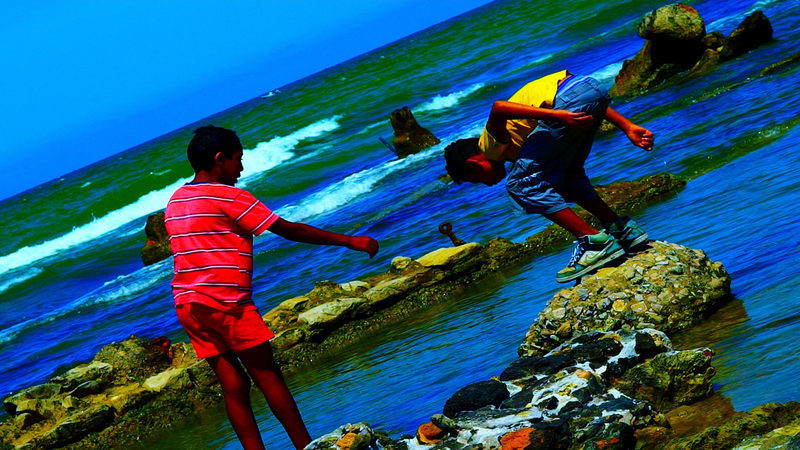
“In between seeing a film about Orson Welles and the new Godard, I heard him blame ‘Animal House,’ ‘Caddyshack’ and ‘Fast Times at Ridgemont High’ for the yearbook. That’s today in cinema history, kids.”
Such read the missive I posted on social media on the afternoon of September 27, 2018. The “him” was of course Brett Kavanaugh, whose testimony before Congress I listened to as I walked across Central Park between the midtown screening room where I saw “They’ll Love Me When I’m Dead,” Morgan Neville’s documentary about the torturous history of Welles’ newly resurrected “The Other Side of the Wind,” and Lincoln Center, where I was to see a New York Film Festival press screening of Jean-Luc Godard’s “The Image Book.”
After nearly four decades of covering New York’s festival, I invariably find my memories of it combine impressions of films and filmmakers with events happening in the world at the time: wars, elections, hurricanes, etc. For 2018, the cinematic recollections will inevitably come intermixed with flashes of the Mueller investigation and the battle surrounding the Supreme Court nomination of Kavanaugh, whose testimony left me with a question: If he and his high school buddies had been watching, say, “Citizen Kane” and “Breathless” instead of the aforementioned Hollywood yukfests, would their yearbook have been as trashy and sexist?
I can’t believe it would have, which in a sense is a roundabout tribute to institutions like the New York Film Festival that educate filmgoers in the higher possibilities of a medium that’s too often used to feed trash to teenagers. As for the cinematic counter-examples that Sept. 28 offered me, they couldn’t have been more perfectly paired. Welles was arguably the medium’s first great modernist and Godard its last; in any case, they stand as twin icons of the kind of auteurist cinema that the New York Film Festival exists to celebrate. That the 2018 edition of the festival, its 56th, contains new films by both masters is more than remarkable; it’s downright astonishing.
Which is not to say that the films are great, just that they’re exactly the kind of works that belong in the NYFF. Of the two, “The Other Side of the Wind” is the problematic one. Like other cinephiles, I spent decades wondering what this legendary “lost” film—which Welles started in 1970 and worked on for well over a decade—would be like if it had been completed. At long last, Netflix assembled a team of experts who combed through 100 hours of footage and, using Welles’ notes, assembled a finished feature. Alas, it’s one that suggests it might have been better left as a tantalizing possibility rather than becoming a rather disappointing reality.
By no stretch of the imagination will “Wind” displace “Kane,” “The Magnificent Ambersons,” “Chimes at Midnight” or “Touch of Evil” at the peak of the Welles canon. It’s more a sprawling curiosity with a bifurcated form: One part dramatizes the last day in the life of a veteran director (excellent John Huston) while the other is a wordless bit of arty filmmaking that was supposedly meant as a satire of European filmmakers like Bergman and Antonioni. To put it kindly, the latter doesn’t work as satire while the director’s-last-day part doesn’t really work as either comedy or drama (though it has a kind of documentary interest). Neville’s fascinating “They’ll Love Me When I’m Dead” wonders if Welles ever really wanted to finish “Wind.” If not, he’s now having the last laugh from the great beyond.

At 87, Godard is still with us and, amazingly enough, still cranking out films that bristle with energy and inventiveness. Though I wouldn’t place it as among his very best, “The Image Book” struck me as a more agreeable and engaging feature than his last few. Unlike “Goodbye to Language,” it contains no actors. More along the lines of “Histoire(s) du cinema” it’s a rapid-fire montage of film clips—referencing everything from “Alexander Nevsky” to “Freaks”—with overlays of cryptic texts and voiceover by Godard. Though less overly political than some Godard films, it continues his interest in the world of Arabs and Islam (the film’s title nods to “peoples of the book”). Though not for non-initiates, the film’s hypnotic meshing of sound and images will enchant longtime Godard fans.
As for the 2018 festival overall, it strikes me as one of the best in recent years. In a sense, that’s a rather paradoxical judgment. Most years, by the time I’ve seen more than half the festival’s Main Slate, I’ve encountered one, two or more films that I consider flat-out masterpieces (last year it was Chloe Zhao’s “The Rider”). This year, I’ve seen nothing so far that merits that description. Also, the complaint I made last year about the festival’s recent lack of global reach still stands; what’s missing this year is any film from Russia and most of its former satellites (Sergei Losnitsa’s Cannes-acclaimed “Donbass” is one example of a film that should have been in the lineup). Yet, on the whole, the mix of films in this NYFF seems broad and well-balanced, suggesting that 2018 overall is shaping up a strong cinema year.

As regards geographic representation, last year I noted that in its first five years, the festival’s current programming regime (led by Kent Jones) had not shown a single Iranian film, having passed on the likes of Kiarostami’s “24 Frames,” Farhadi’s “Salesman” and Jafar Panahi’s “Taxi.” This year, thankfully, that trend has been reversed with the inclusion of Panahi’s “Three Faces,” which won Best Screenplay at Cannes.
Though Panahi is banned from making films and nominally under house arrest, “Three Faces” shows him not only making his fourth feature since the ban but also traveling to parts of Iran far removed from Tehran. The film’s premise is intriguing: a famous actress (Behnaz Jafari) receives an iPhone video apparently showing the suicide of a young woman whose dreams of acting have been thwarted by her family. Along with Panahi, the actress goes to the remote village where the girl lived in search of the truth about her fate, a village that’s also the home of an old actress who was banned from movies after the Revolution.
Though it connects with themes of previous Panahi films, “Three Faces” also is something of a departure in its intriguing, purposeful ambiguity. We are left wondering about the journey’s real purpose as well as the filmmaker’s intent throughout, which makes it a film that almost demands a second viewing. It’s also one of the director’s most distinctive stylistic achievements, with a visual elegance that sometimes reminded me of Antonioni films like “The Passenger.”

The European film that I’ve so far liked best in the festival, “Transit” by Germany’s Christian Petzold, also concerns journeys and has an air of mystery not unlike that of Panahi’s film. From its first scene, the film presents us with an anomalous reality: We apparently are in France under Nazi occupation, yet the setting is present-day. A German fleeing the occupiers (Joaquin Phoenix lookalike Franz Rogowski) moves from Paris to Marseille, where posing as a dead novelist whose papers he possesses seems to promise an escape to Mexico.
Based on a 1942 novel, “Transit” rests on a conceit that could have fallen flat. Yet the overlaying of two different era somehow works, and indeed it has a chilling undertow given the recent recrudescence of fascism in Europe. But the film’s real power stems from Petzold’s skills as a stylist and storyteller, which are on constant display in this suspenseful, romantic drama.
One change in the NYFF’s programming this year is that its Opening Night, Closing Night and Centerpiece are not premieres. Until recently all three slots were occupied by premiering films. Most major festivals place a great deal of emphasis on premieres. I’ve argued that sometimes this emphasis is excessive, but it’s also understandable in terms of prestige and image. Last year, I noted that the NYFF in recent times has offered fewer and fewer and premieres and discoveries. I have no idea why they’re leaving off having premieres in their main slots now, but it inspires this suggestion: if the practice continues, they should discontinue the practice of press-screening the Opening, Closing and Centerpiece films on the days of their public showings (which I believe began a few years ago when major studios didn’t want reviews to appear before the day the film premiered).
In years past, before the short span when the NYFF had major-studio films on Opening Night, the slot generally went to major auteurs—from Robert Altman to Zhang Yimou to Mike Leigh—whose latest film seemed to mark a career high point. This year’s opener, “The Favourite,” comes from Yorgos Lanthimos, whose small body of work (e.g., “The Lobster”) has struck me as minor, pretentious and distasteful. But if he’s not a major auteur by a long shot, his latest is a very appropriate Opening Night film because it’s a bonafide art-house crowd pleaser.
Set at the beginning of the 18th century in an England of enormous wigs, elegant country houses and bitter infighting, the film centers on the conflict between Lady Sarah (Rachel Weisz) and an ambitious servant girl, Abigail (Emma Stone), for the favor of Queen Anne (Olivia Colman). Reminiscent of Peter Greenaway’s “The Draughtsman’s Contract,” the tale here is droll, intricate and malicious, full of anxious scheming and devious betrayals. I don’t think this adds up to a vision on the part of Lanthimos, whose glib misanthropy hardly equals the more profound and potent variety offered by Michael Haneke. But his direction, with its showy use of wide-angle lenses, is capable enough, and it provides a very suitable frame for the film’s two most notable assets—Emma Stone’s luminous performance and Deborah Davis & Tony McNamara’s witty, well-constructed script.

Last year, the festival seemed surprisingly short on Asian films. This year, it contains an abundance, including a Chinese film that so far is my favorite among everything I’ve seen press-screened. Made by Ying Liang, a filmmaker who was exiled to Hong Kong after his previous film, “When Night Falls,” angered the Chinese government, “A Family Tour” is an autobiographical drama that has lots to say about the differences and complicated connections that exist between the People’s Republic, Hong Kong and Taiwan.
Ying makes his fictional alter ego a woman. Filmmaker Yang Shu (Gong Zhe) takes her husband and toddler with her when she goes to Taiwan for the Formosa Film Festival, where her previous film is being shown; her elderly mom comes along, too, as part of a tour group. Since she, like Ying, is known as a dissident, she’s bombarded at every turn by questions about political issues, so she has to maintain a tricky balance between honesty and discretion.
A compelling, beautifully nuanced study of exile and displacement, the film underscores what a difficult position politically minded independent filmmakers still occupy in China. It is one of the bravest, most informative and persuasive films I’ve ever seen on this important subject, as well as one of the most elegantly crafted of recent Chinese movies. To my knowledge, “A Family Tour” currently has no U.S. distribution, so its shows on Oct. 2 and 3 at the NYFF may be New Yorkers only chances to see it.
Godfrey Cheshire is a film critic, journalist and filmmaker based in New York City. He has written for The New York Times, Variety, Film Comment, The Village Voice, Interview, Cineaste and other publications.





